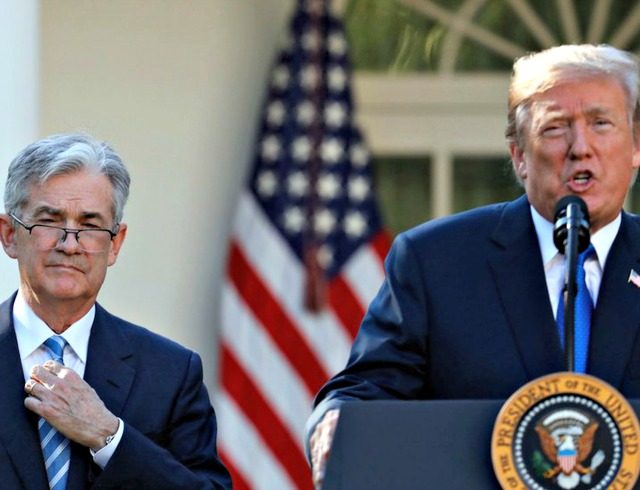Time and again over the last few months, Donald Trump has defied the conventional wisdom of economists–prompting cries of foul and dire warnings of economic ruin.
Fiscal stimulus from tax cuts was said to risk overheating the economy, which in turn would either trigger too much inflation or prompt the Federal Reserve to tighten the economic screws by raising interest rates. The tariffs on steel and aluminum were going to hurt U.S. consumers and U.S. manufacturers. The spending bill Trump signed into law was described as “budget-busting.”
Yet there is one group of very important economists and economic policy folks who have demonstrated a remarkable equanimity amid the panic over what Trump’s policies could mean for the economy. They see the economy and labor market as strengthening. Inflation as remaining very much under control and perhaps continuing to undershoot the official target of two percent. Their views of where interest rates are heading haven’t been changed by tax cuts or the spending bill. And they do not see the metals tariffs as doing harm either to consumers or businesses.
So who are these happy mavericks?
They are the policymakers of the Federal Reserve, the members of the Federal Open Market Committee. In minutes released Wednesday of the FOMC’s March meeting there were no dire warnings of unsustainable budgets, out-of-control inflation, or ruinous tariffs. Instead, the Fed’s leaders sounded positively pleased with recent economic developments.
“In their discussion of economic conditions and the outlook, meeting participants agreed that information received since the FOMC met in January indicated that economic activity had been rising at a moderate rate and that the labor market had continued to strengthen,” the minutes said.
While that might not exactly count as cheerleading, and falls far short of the ecstatic remarks often heard from some of Trump’s more ardent supporters, it is a far cry from what has passed for mainstream commentary on the president’s policies.
Here’s what they said about inflation: “Market-based measures of inflation compensation had increased in recent months but remained low; survey-based measures of longer-term inflation expectations were little changed, on balance.
They waved off fears of tariffs. “Participants did not see the steel and aluminum tariffs, by themselves, as likely to have a significant effect on the national economic outlook,” the minutes said. To the contrary, any economic risk from tariffs would come from “the prospect of retaliatory trade actions by other countries,” according to the “strong majority” of Fed officials at the meeting.
The tax cuts and budget will grow the economy: “Tax changes enacted late last year and the recent federal budget agreement, taken together, were expected to provide a significant boost to output over the next few years,” according to the minutes.
It’s not that the Fed is blind to potential risks. The minutes note that we do not have much history with such large tax cuts at a time of relative economic prosperity. They also note that uncertainty as to whether some tax cuts will be permitted to expire makes it hard to predict what their effects will be. Budget deficits do get a passing reference in the minutes.
The Fed’s relative openness to Trump’s economic policies was foreshadowed months ago when the Fed made it clear that, contrary to the expectations of many Fed watchers, it was not the enemy of his tax cut program.
There’s something reassuring about all this. The Fed clearly is not suffering from Trump Derangement Syndrome, the compulsion to present all of Trump’s policies as terrible, no-good, very bad. It knows what Trump has done and thinks the economy has strengthened.
At the same time, there is something disheartening in all this. The Fed has shown us what sober economic commentary could look like if so much of economic punditry and economic forecasting had not been afflicated with T.D.S.

COMMENTS
Please let us know if you're having issues with commenting.